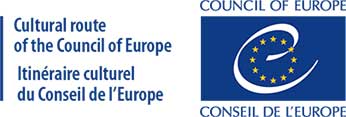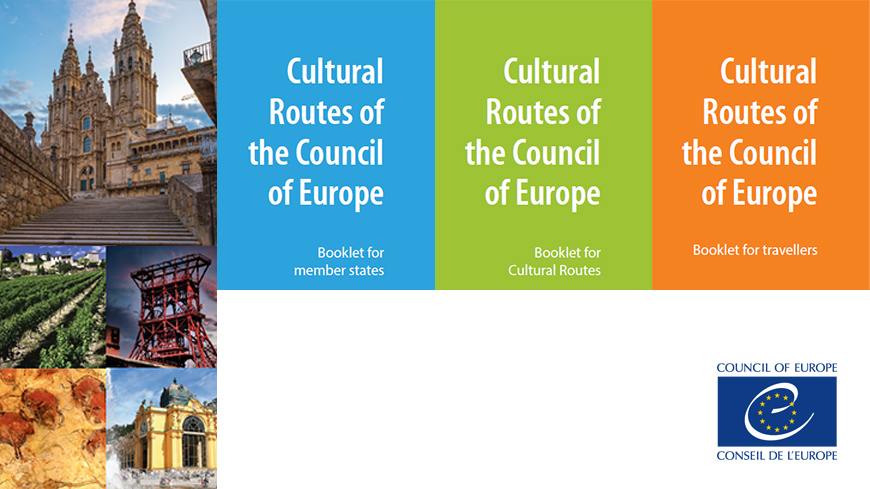
"Cultural Routes of the Council of Europe"
Certification
The Cultural Routes of the Council of Europe programme was launched in 1987 to demonstrate, via journeys through space and time, how the heritage of the different countries in Europe contributes to a shared cultural heritage.
The programme acts as a channel for intercultural dialogue and promotes better knowledge and understanding of European cultural identity while preserving and enhancing natural and cultural heritage.
The Council of Europe is the continent’s leading human rights organisation. It comprises 46 member states, including all the members of the European Union. All Council of Europe member states have signed the European Convention on Human Rights, a treaty designed to protect human rights, democracy and the rule of law.
In 2010, the Enlarged Partial Agreement on Cultural Routes of the Council of Europe (EPA) was established in order to strengthen the programme politically and financially.
The EPA, based on criteria established by the Committee of Ministers Resolution CM/Res(2023)2, awards the certification “Cultural Route of the Council of Europe” during the meetings of its Governing Board.
Cultural Routes are evaluated regularly by the EPA and are certified by the Council of Europe based on several criteria:
involve a theme that is representative of European values and common to at least three countries in Europe;
be the subject of transnational, multidisciplinary scientific research;
enhance European memory, history and heritage and contribute to interpretation of Europe’s present-day diversity;
support cultural and educational exchanges for young people;
develop exemplary and innovative projects in the field of cultural tourism and sustainable cultural development;
develop tourist products and services aimed at different groups.
The “Cultural Route of the Council of Europe” certification provides unique benefits for Cultural Routes and their network members:
Certification and quality assurance
Following a rigorous evaluation process, the certification leads to greater recognition and opportunities to develop membership, secure project funding and increase visitor numbers across network members.
Networking
The programme offers opportunities to network with other Cultural Routes, providing better access to national authorities, European stakeholders, international Organisations, NGOs and international experts.
Visibility and communication
Being a certified “Cultural Route of the Council of Europe” brings more visibility both nationally and internationally through the Cultural Routes programme website and communication materials, together with the representation at major international conferences, fairs and events.
Capacity building
The programme provides a unique opportunity for cultural routes stakeholders to share good practices, learn from global trends and developments, and access world-class knowledge on cultural heritage and tourism management tools and methods during tailor made trainings and events.
Access to funding opportunities
The certification provides funding project applications with strong quality assurance. In the last 5 years, certified Cultural Routes have obtained some 17 million euros in European funds.
Advocacy
Cultural Routes network operators enjoy greater access to regional and local policy makers that are able to better convey to institutional stakeholders the need for sustainable protection and promotion of our shared European heritage. Further support comes from closer interaction with national Ministries of Culture and Tourism, members of the Enlarged Partial Agreement on Cultural Routes.
Sustainability
Cultural Routes follow the UN Sustainable Development Goals and thus contribute to improve local economies, provide support to SMEs and promote local identity and shared European values. Ninety percent of the Cultural Routes cross rural areas, which brings additional cultural, social and economic opportunities to less well-known destinations.
Community involvement
Cultural Routes promote less-known destinations, while fostering local management of sites and activities insuring access to cultural heritage to all citizens.
Scientific Research
The Cultural Routes programme works in close collaboration with a network of Universities providing support to the programme through research, expertise and advice.
Network development
Cultural Route operators support the development of national, regional and local cultural heritage and tourism clusters around the certified Cultural Routes and help to expand the existing networks by reaching potential sites and involving additional stakeholders across Europe.
Access to Council of Europe events and trainings
Cultural Routes have access to exclusive events and trainings, including the Annual Advisory Forum, the Annual Training Academy, specific training seminars, tourism and culture fairs, among others.







